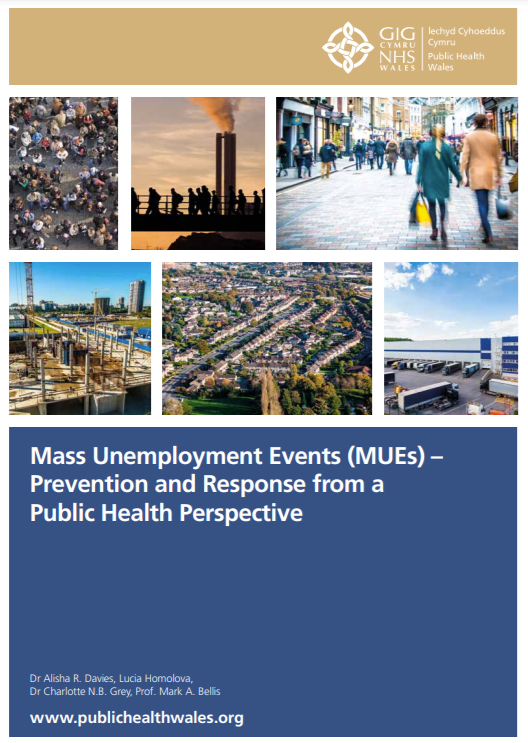In the year following job loss due to mass unemployment events, workers can experience double the risk of death from heart attack or stroke and even greater increases in risk from alcohol related disease. Detrimental impacts on health can last for decades with family members sometimes affected almost as much as those facing redundancy. Working with experts across the world, Public Health Wales has led new work on public health approaches to preventing and preparing for Mass Unemployment Events which focuses especially addressing their impact on the health of individuals, families and communities.Report author Dr Alisha Davies, Head of Research and Development at Public Health Wales, said: “Employment and health are interlinked – we know that good quality, secure employment is good for health. Unfortunately large scale redundancies do occur and the impact can be devastating for those directly employed, and extend to families and communities. Internationally, these events are not uncommon, but there is much we can do to prevent, prepare and limit the impact on health when they do happen. This report highlights the importance of ensuring health and wellbeing is at the core of preventative and responsive action.”
The report – ‘Mass Unemployment Events (MUEs) – Prevention and Response from a Public Health Perspective’ – also provides an eight-step framework to support public, voluntary and private sectors with prevention, planning for and reaction to mass unemployment events.
The framework identifies key priorities where public health approaches can help with early identification of areas at risk and ensuring responses address the health and wellbeing needs of all those affected including families, the wider community and specific vulnerable groups, such as the existing long term unemployed.
Professor Sir Mansel Aylward, Chair of Public Health Wales said: “Preparedness for mass unemployment events is essential and of global relevance. Drawing on commonalities across national and international responses to mass unemployment events, this report clearly identifies the importance of addressing the health impact of these events, and provides a framework which can be adopted by other countries facing current or threatened mass unemployment.”
Some examples of key areas outlined in the report include:
- Incorporating mapping of strategic employers in an area, alongside national and global industrial trends, into the local or national public health planning process to help identify areas at risk of mass unemployment events.
- Make use of public health tools including Health Impact Assessments, and the Health Assets Reporting Tool to understand the economic, social and health impact of mass unemployment events and capacity of communities to absorb shocks.
- Ensure systematic representation of health and community partners on the strategic response group to improve understanding of the acute and longer term health risks to communities, and help mobilise resources in health and community to support.
President of the UK’s Association of Directors of Public Health, Dr Andrew Furber, said: “This new guidance from Public Health Wales will not only be of great value to Directors of Public Health in Wales but also throughout the rest of the UK, and internationally where local public health leaders are trying to mitigate such tragedies.
“Having a good job contributes hugely to good health. Losing your job, especially in the context of sudden mass unemployment, can have profound effects on health and wellbeing.
“As this guidance makes clear, alongside dealing with employment and financial support, any response must be informed by the need to protect and improve health and wellbeing.”
Professor Mark Bellis of Public Health Wales commented, “Despite us hoping they never happen, public health routinely plans and prepares for large scale weather, contamination and other potentially devastating events. This report shows how mass unemployment events require a similar precautionary public health approach so that we are ready to minimise harms to the health of those facing redundancy as well as the families and communities around them.”
The eight key priority areas for action outlined in the report are:
1) Identify communities at risk of mass unemployment events and assess the potential impact
2) Develop an early warning approach for potential mass unemployment events
3) Early mobilisation of a multi-sector response, including health and community perspectives
4) Early implementation of tripartite (re-employment, financial, health & wellbeing) support for redundant workers
5) Address the needs of specific groups, including those older and unskilled
6) Extend support to family members
7) Support the wider community and harness assets
8) Evaluate the impact of the response
Other preventative measures identified in the report included longer term consideration of skills development, investment and diversification, social responsibility of employers, and increasing individual and community resilience.
This report and response framework is an important tool to inform action to minimise the consequences and harms of mass unemployment events to population health.
Report
Contact
Dr Alisha Davies: [email protected]

